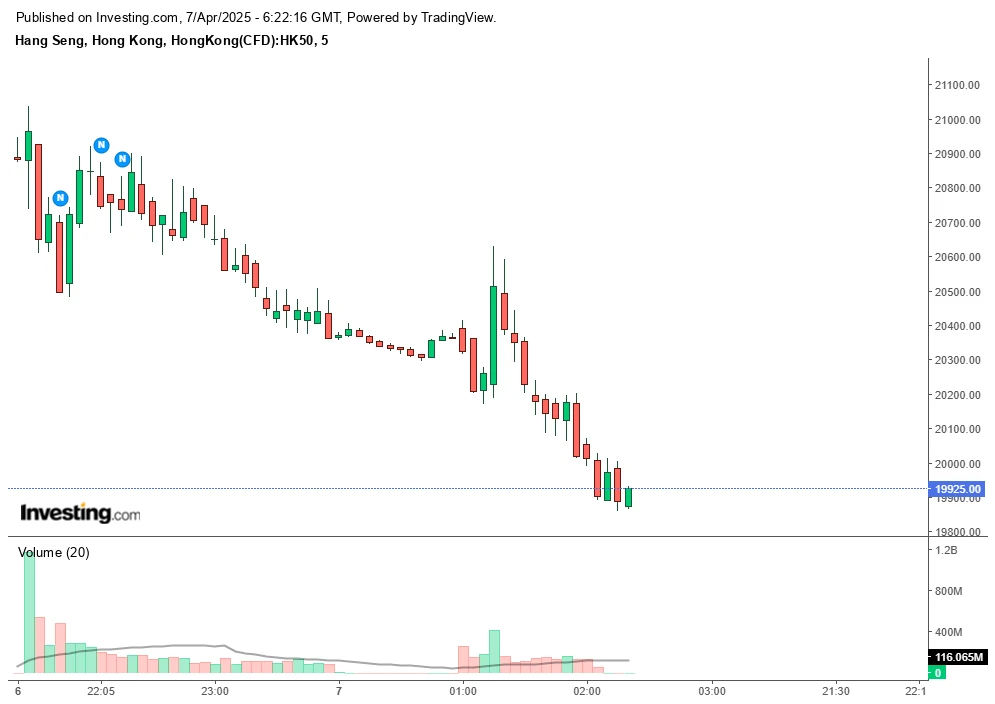‘Black Monday’ takes toll on global economy, Türkiye and cryptocurrencies
 The illustration depicts a digital stock chart overlays a backdrop of U.S. dollar bills, symbolizing the volatile reaction of global financial markets to geopolitical tensions and economic uncertainty, created on Apr. 7, 2025. (Collage by Türkiye Today)
The illustration depicts a digital stock chart overlays a backdrop of U.S. dollar bills, symbolizing the volatile reaction of global financial markets to geopolitical tensions and economic uncertainty, created on Apr. 7, 2025. (Collage by Türkiye Today)
The world’s financial markets are in turmoil, facing what is being called a “Black Monday,” primarily sparked by escalating tensions between the United States and China that have led to full-blown trade war.
The chaos began in Asia, where stock markets plunged following China’s retaliatory measures against the U.S. in response to President Donald Trump’s latest round of tariffs. Fears of a prolonged trade war sent shockwaves throughout global markets.
In Hong Kong, the Hang Seng Index fell sharply by 13.2%, marking its largest drop since the 1997 Asian financial crisis. Similarly, in China, the Shanghai Composite dropped by 7.3%, losing 258 points. The losses were not contained to China, as Taiwan’s market saw a significant dip of 9.7%, while Japan’s Nikkei plummeted by 7.8%. Even India’s Nifty index saw a 3.2% drop at the open.

The sell-off quickly spread across the globe, with markets declining by 7.4% in Singapore, 4.2% in Australia, and 5.5%. in South Korea. The financial markets in Europe weren’t spared either, with Italy down by 6.9%, Sweden by 6.2%, and the Netherlands and Australia both seeing declines of 6.1%. France dropped by 6%, Spain by 5.7%, and and Germany saw a 10% loss before a modest recovery. Meanwhile, Switzerland saw a 5.5% decrease, and the UK’s markets lost 4.6%. Other countries such as the Philippines and Malaysia saw declines of 4.3% and 4%, respectively.
As the global sell-off deepened, President Trump maintained his firm stance on tariffs, calling them the necessary “medicine” to address the U.S. trade deficit. “I don’t want anything to go down, but sometimes you have to take medicine to fix something. Our country has gotten a lot stronger… and eventually, it’ll be the most dominant country in the world economically,” he stated.
Impact of ‘Black Monday’ on Türkiye
The economic turmoil also impacted Türkiye, with the BIST 100, the main index on the Turkish stock market, dropping by 2.5%.

The banking index led the decline, down 3.61%, while the holding index dropped 2.80%. All sector indices fell at the opening, with banking stocks posting the steepest losses.
Analysts noted that, technically, the BIST 100 Index has support at the 9,100 and 9,000 levels, with resistance seen at 9,200 and 9,300 points.
Cryptocurrencies effected, Bitcoin down 10%
The carnage wasn’t limited to traditional markets. Cryptocurrencies also took a hit, with Bitcoin, the world’s largest digital asset, plunging by nearly 10%, dropping to around $75,000. This loss wiped out almost $150 billion in market cap.

Ethereum, with the second-largest market cap, fell by 17% to $1,488. The whole digital currency market dropped by 10.43% to $2.37 trillion, Coinmarketcap data showed.
The barrel price of Brent oil dropped by 3.3% to $63.4 while natural gas prices fell around 2%. The ounce price of gold lost 0.34% to $3,026. It saw over $3,100 level last week. Silver price went up by 1.6%. The price of copper dropped by 0.7% and steel lost 2.43%.
United States wakes up to the Black Monday
U.S. stocks dropped sharply at Monday’s open as well, following global market declines, as concerns grew that aggressive trade measures could harm global growth and trigger an economic downturn.
All three major U.S. indices fell over 3%, continuing the market turmoil. Twenty minutes into trading, the Dow was down 3.6% at 36,947.62, the S&P 500 dropped 3.5% to 4,897.96, and the Nasdaq lost 3.7%, falling to 15,017.24.



